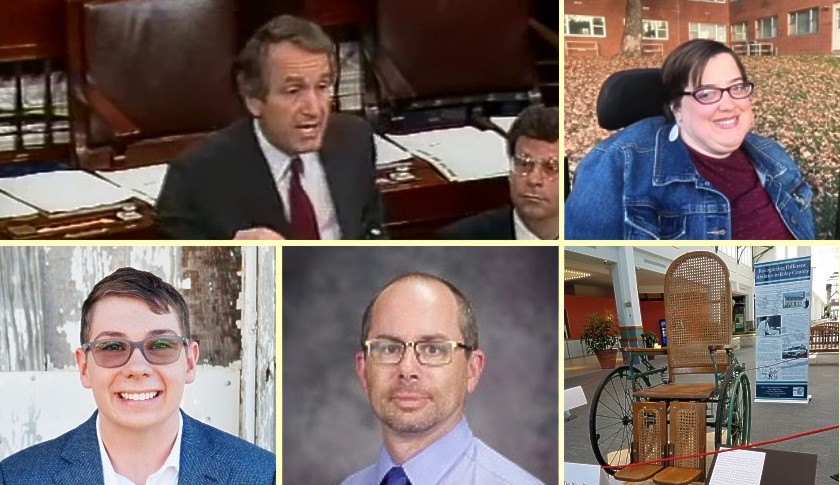Kansas Snapshots by Gloria Freeland - July 30, 2021
Happy Birthday, ADA
Hilary Garrett is much like thousands of other students at Kansas State University. But unlike most, who don't worry about how
to get from here to there, she has to negotiate the campus using a wheelchair.
"Without the ADA, I couldn't go to college," Garrett said.
The ADA – Americans with Disabilities Act – which was 31 years old this past Monday, has helped her and many others live
independently. Garrett, 29, is a K-State social science major and the current Ms. Wheelchair Kansas. She also works in her
parents' wine-making business.
While living in a residence hall on campus, she found it difficult to navigate to her food center. The doors were hard to open
and there were no windows in them. Without being able to see if someone was coming from the opposite side or for them to see
her, she was sometimes hit by the heavy doors.
I can relate in a small way. In 1997, I had an autoimmune disease that left me unable to breathe, walk, eat, speak or use my
hands. I was hospitalized for three months in three different cities. Once on the road to recovery, I used a wheelchair, and I
remember feeling so frustrated during a visit to a grocery store. The doors were hard to open and the wheels sank into the
rubber-backed rugs at the entry, making it difficult to move forward.
My experience was temporary as I fully recovered, but Garrett has to deal with these issues every day.
She went to K-State's Student Access Center to express her concerns. The people there took action. Now all dining hall doors
have windows and buttons that operate door openers.
Ethan Brown, 19, a sophomore majoring in marketing and minoring in leadership, is another K-State student who uses a wheelchair.
He is also the access director in the presidential cabinet of K-State's Student Government Association.
"Something I like to remind listeners," Brown said, "is that the community of people with disabilities is the only minority
affiliation that anyone can unwillingly join at any time in his or her life."
He said he's been able to have normal life experiences because the ADA eliminated barriers to his participation. He is living
on campus, and has an internship that requires traveling, which he has been able to do because of ramps, wheelchair assistance,
accommodated ground transportation and accessible hotel rooms. He also has a specially-trained service dog.
The Riley County Historical Museum recently celebrated the opportunities ADA has afforded all people. Its exhibit – "Recognizing
Different Abilities in Riley County" – is currently on display at the museum and focuses on how K-State, Manhattan and the county
have made strides toward accessibility and equality. The benefits ADA has afforded to citizens in Riley County are mirrored
across the state and nation.
Museum director Cheryl Collins noted that even the able-bodied have benefitted.
"For example, when families are pushing strollers, they're able to roll along a sidewalk and cross curbs easily," she said. "And
I think bicyclists have benefitted by curb cuts as well. So, ADA has given convenience to all of us, as well as basic access to
some."
Jason Maseberg-Tomlinson, director of K-State's Student Access Center, agreed.
"Even today, we talk about digital curb-cuts, actions that assist all users," he said. "An example of that has been captioning.
Captioning content provides all people with a better means to recall information. It is essential for some people to have
access, but it is helpful to many who benefit from seeing and hearing information."
He said the center works to assist students in setting up reasonable accommodations for academic programs and on-campus housing.
In order to do that effectively, he and his staff also help make the campus a more inclusive environment for people with
disabilities.
"Many tools around us have increased our ability to be more autonomous, regardless of disability status," he said. "There is
still much work to be done, but we have come very far."
Brown also believes progress has been made, but more needs to be done.
"I remember this quote from President Theodore Roosevelt," he said. "'This country will not be a good place for any of us to
live in unless we make it a good place for all of us to live in.'"
